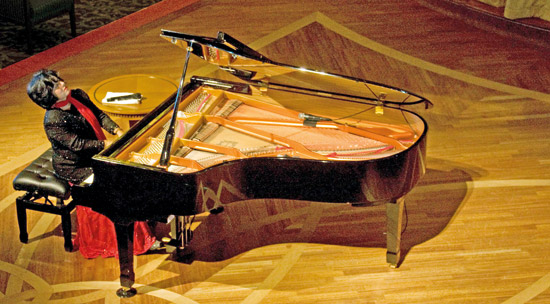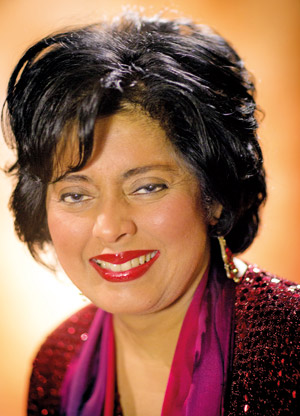Giving back: Sujeeva Hapugalle here for recital
Even one hundred years after George Gershwin’s Rhapsody in Blue was debuted in 1924, it seems an extraordinary departure from everything that came before it. Gershwin brilliantly fused what he described as “a kaleidoscope of America, our national pep, our blues, our metropolitan madness.” With its influences of jazz and blues and even the soundtrack of the railways and the street — he conceived of the piece on a train — the American composer “turned everything around. Nothing was the same with classical music and jazz again,” says Sujeeva Hapugalle, who is playing its original piano version as a solo in her concert on September 3 with the Chamber Music Society of Colombo.

Sujeeva, a Steinway artist, lives near San Francisco where she started a Rush Hour recital series that ran for half a dozen years in the financial district of the city. ’s childhood was in Colombo, but her career has been divided between the UK, where she lived after receiving a scholarship in 1982 to study at the Royal College of Music, and the US. The programme is bookended with piano quartets by Mozart and Mahler, which she will perform with members of the CMSC, led by concertmaster Lakshman Joseph-de Saram.
Sujeeva says Joseph-de Saram gave her “carte blanche” in the programme for the concert, initially suggesting a solo performance, but she was also keen to perform with the CMSC members. “I wanted to interact with musicians in Colombo. (Music) is a language that creates an instant unity,” she says. “The repertoire is hundreds of years old, but you can still have a fresh take.”
In early August, three of the CMSC’s members, including Joseph-de Saram, practised the music for the Mozart piano quartet in E flat and Mahler piano quartet in A minor without the pianist, who arrived in Colombo about ten days before the concert. The vigour of the string instrumentalists made up for the absence of the piano, akin to an imaginary friend for that evening. Joseph-de Saram describes the Mozart quartet in E flat, which has the exhilarating quicksilver twists and turns of the composer’s later piano concertos, as “one of the great chamber music pieces written in the classical era.”

Sujeeva Hapugalle
In addition to Rhapsody in Blue, which earned Gershwin the equivalent of what would be $4.5 million today in the ten years after it was composed, also especially close to Sujeeva’s heart are Maurice Ravel’s Une barque sur l’ocean and Sonatine. Ravel and Gershwin were kindred spirits. When Gershwin travelled to Paris after Rhapsody’s huge success, he asked Ravel for lessons in orchestration. After hearing what Gershwin had earned in a year, Ravel reportedly replied. “Then it is I who should be taking lessons from you.”
Sujeeva’s love for Ravel’s Boat on the Ocean is so passionate that even during an interview, she cannot help playing a passage from the piece. “He goes to the depth of the ocean,” she says excitedly. “It’s only with Ravel I get to use this one note.” Sujeeva then plays the last key, called A-1, on the left-hand side that sounds, even over Zoom, like a giant gong being struck in a temple. “It has a one-of-a-kind resonance. This is just a gorgeous piece. I could speak for the whole interview on it.” In opening the doors to Impressionism in music, Ravel “coaxed performers to use more texture and colour.”
Sujeeva enjoys that and telling stories through music. From Ravel, she segues to the Chopin Ballade No. 1 in G Minor that she is playing on September 3. She sees the Ballade as a conversation between “two characters: one questioning, the other ethereal… Chopin builds operatic scale and narrative.” Indeed, the concert is a tour de force of music, from the Schumann/Liszt Dedication early on to the majestic Mahler quartet at its conclusion.
Sujeeva is a consummate performer, whose work includes concerts on cruise ships run by Cunard, including one to Alaska most recently. But, she is also a dedicated teacher who seems almost nostalgic for the “valuable mindfulness” that the pandemic afforded students. Sujeeva will be donating her time for the concert and a masterclass because she wants to give back to the country of her birth but also pay homage to her teachers, including her mother and Mary Billimoria and the late David Parkhouse, who with his cellist wife Eileen, took her under their wing when she was selected from aspirants in Hong Kong and South Asia to study at the Royal College of Music four decades ago. Sujeeva joined others to convince Eileen to start the only piano based-chamber music competition in London named after Parkhouse, who died in 1989.
The concert is a benefit for CMSC’s education fund and is sponsored by Malinee Jayasinghe-Peris who is dedicating it to two of her teachers: Alix Cockburn taught Peris when she was a child in Colombo and the Hungarian pianist Louis Kentner gave her classes for free when she was at the Royal College of Music. He and his wife Griselda invited Peris on holidays with them to Switzerland where they were joined by Yehudi Menuhin, the legendary violinist.
In a moving tribute that accompanies the programme, Peris-Jayasinghe, who turned 95 on June 30 this year and still teaches the piano at George Washington University in the US, shows near total recall of details such as Cockburn’s delicious desserts that she was given as a schoolgirl as a reward for playing well.
In a concert to support CMSC’s education efforts, the evening will also be a testament to the almost indestructible bonds that often form between music teachers and their proteges.
Sujeeva Hapugalle’s recital with Chamber Music Society of Sri Lanka is on Tuesday, September 3 at the Lionel Wendt. Tickets are on sale at the Department of Coffee and the Lionel Wendt box office.
Searching for an ideal partner? Find your soul mate on Hitad.lk, Sri Lanka's favourite marriage proposals page. With Hitad.lk matrimonial advertisements you have access to thousands of ads from potential suitors who are looking for someone just like you.


